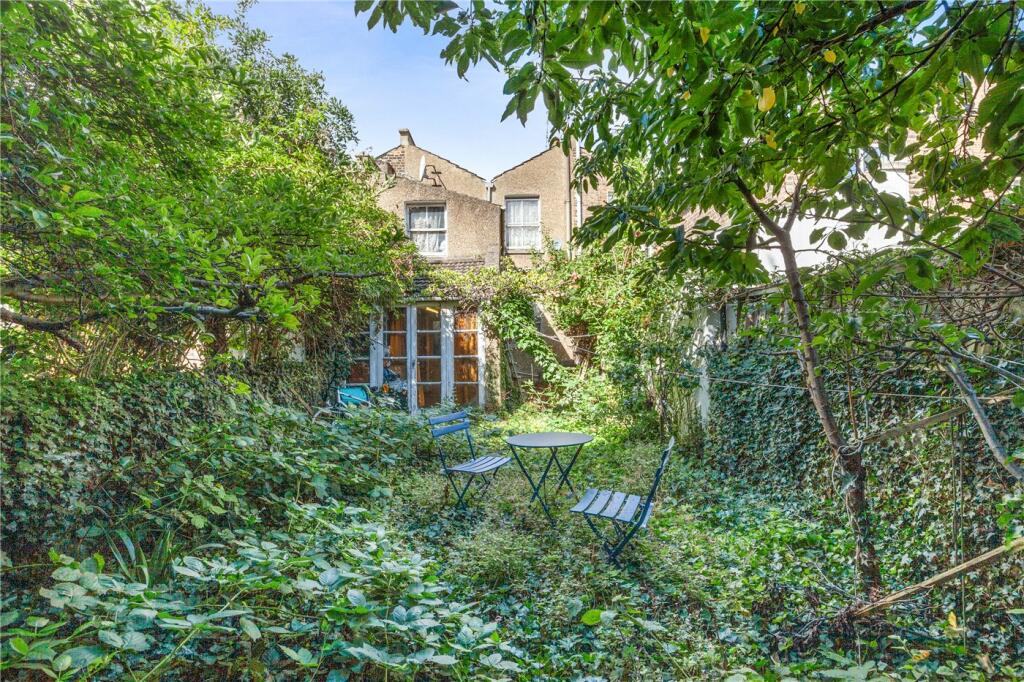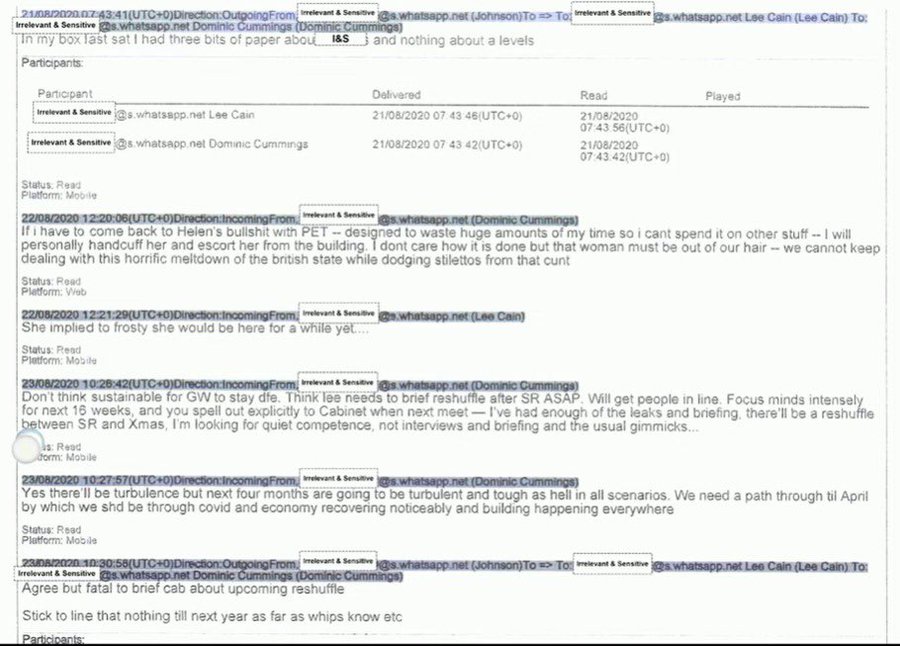POL Politiek
Discussies en diepgaande gesprekken over de politiek in de breedste zin van het woord kun je hier voeren.



Overigens zijn er best huizen te koop 
Voor £1 miljoen.
https://www.rightmove.co.uk/properties/138887570#/?channel=RES_BUY
Voor £1 miljoen.
https://www.rightmove.co.uk/properties/138887570#/?channel=RES_BUY


Ja, erg rustiek.quote:Op donderdag 26 oktober 2023 16:52 schreef George_of_the_Jungle het volgende:
Overigens zijn er best huizen te koop
Voor £1 miljoen.
https://www.rightmove.co.uk/properties/138887570#/?channel=RES_BUY
[ afbeelding ]
[ afbeelding ] [ afbeelding ]
[ afbeelding ]
Totaal geen luchtbel die huizenmarkt zie ik al.
Mis wel het vlekkerige tapijt in die badkamer/toilet-ruimte.
And what rough beast, its hour come round at last,
Slouches towards Bethlehem to be born?
Slouches towards Bethlehem to be born?


Tja, London, he?quote:Op donderdag 26 oktober 2023 16:52 schreef George_of_the_Jungle het volgende:
Overigens zijn er best huizen te koop
Voor £1 miljoen.
https://www.rightmove.co.uk/properties/138887570#/?channel=RES_BUY
[ afbeelding ]
[ afbeelding ] [ afbeelding ]
[ afbeelding ]
Niet dat Amsterdam veel beter is, overigens.


Nog een bye bye election?
How do we turn this world-class fuck-up into a world-class learning experience?


Dit artikel heeft een lijst met alle MP's die wat moeilijkheden met de wet hebben (gehad), vrijwel allemaal Tories:quote:Op donderdag 26 oktober 2023 19:25 schreef Hyperdude het volgende:
[ twitter ]
Nog een bye bye election?
https://www.theguardian.c(...)and-drugs-possession
[ Bericht 0% gewijzigd door #ANONIEM op 26-10-2023 20:09:01 ]


Dus het moest gemeld worden omdat hij gearresteerd was, maar hij vond de arrestatie onnodig omdat hij meewerkte. Volgens mij wilde hij vooral voorkomen dat hij het moest melden.quote:Op donderdag 26 oktober 2023 19:25 schreef Hyperdude het volgende:
[ twitter ]
Nog een bye bye election?


Tweemaal ondervraagd waarbij hij bij het tweede interview gearresteerd is. Dat is nogal wat, eigenlijk en ook niet voor een witteboorden vergrijpje.quote:Op donderdag 26 oktober 2023 20:25 schreef George_of_the_Jungle het volgende:
[..]
Dus het moest gemeld worden omdat hij gearresteerd was, maar hij vond de arrestatie onnodig omdat hij meewerkte. Volgens mij wilde hij vooral voorkomen dat hij het moest melden.


quote:Op donderdag 26 oktober 2023 20:08 schreef Tijger_m het volgende:
[..]
Dit artikel heeft een lijst met alle MP's die wat moeilijkheden met de wet hebben (gehad), vrijwel allemaal Tories:
https://www.theguardian.c(...)and-drugs-possession
How do we turn this world-class fuck-up into a world-class learning experience?


Ben benieuwd, volgens Ourworldindata doet UK het nog steeds slechter dan Frankrijk en Duitsland. Denk dat dit wel een relevant segment van het artikel is:quote:Op donderdag 5 oktober 2023 06:35 schreef Bondsrepubliek het volgende:
De economie van het VK is meer gegroeid dan aanvankelijk werd gedacht.
[..]
https://www.bbc.com/news/business-66957412
quote:Samuel Tombs, chief UK economist at Pantheon Macroeconomics, noted that when it came to international comparisons, "a stable picture might take some time to emerge, given that statistical authorities in other countries are revising their data too".


Gaat de goede kant op daar.
quote:Flagship study finds a million children experienced destitution in the UK last year
• Around 3.8 million people experienced destitution in 2022 – a 61% increase since 2019
• This includes around 1 million children – an 88% increase since 2019
• The number of people experiencing destitution in the UK has more than doubled in the last five years – up from 1,550,000 in 2017
• Since 2017 the number of children experiencing destitution has almost tripled – an increase of 186%
• Almost two thirds of people who experienced destitution in 2022 have a disability or chronic health problem
• The social security system is not protecting people from destitution: 72% of those destitute are in receipt of benefits
People are considered destitute if they have not been able to meet their most basic physical needs to stay warm, dry, clean and fed. This can be because they either lack necessities like clothing, heating, shelter or food. Or because their income is so extremely low that they are unable to purchase these items for themselves.
And what rough beast, its hour come round at last,
Slouches towards Bethlehem to be born?
Slouches towards Bethlehem to be born?


Hier laat je nog geen varkens in verblijven.quote:Op donderdag 26 oktober 2023 16:52 schreef George_of_the_Jungle het volgende:
Overigens zijn er best huizen te koop
Voor £1 miljoen.
https://www.rightmove.co.uk/properties/138887570#/?channel=RES_BUY
[ afbeelding ]
[ afbeelding ] [ afbeelding ]
[ afbeelding ]
1/10 Van de rappers dankt zijn bestaan in Amerika aan de Nederlanders die zijn voorouders met een cruiseschip uit hun hongerige landen ophaalde om te werken op prachtige plantages.
"Oorlog is de overtreffende trap van concurrentie."
"Oorlog is de overtreffende trap van concurrentie."


Als iemand nog illusies had over Boris Johnson of the Tory partij dan zou men nu toch wel genezen moeten zijn.
De covid hearings zijn begonnen en wat hier uitkomt is een premier die totaal niet weet waar hij mee bezig is, hij wilde geen bijeenkomsten met de first ministers van Wales, Schotland en NI omdat het teveel op de EU zou lijken. Tijdens covid, he? Terwijl iedereen gewoon zijn eigen beleid voerde.
https://www.theguardian.c(...)n-uk-politics-latest
Hancock die zijn collega ministers ronduit voorloog....Cummings die vloekend en tierend de rondes deed (en nog wat mysoginie voor de lol erbij) en Johnson die alles teveel werk vond.
De covid hearings zijn begonnen en wat hier uitkomt is een premier die totaal niet weet waar hij mee bezig is, hij wilde geen bijeenkomsten met de first ministers van Wales, Schotland en NI omdat het teveel op de EU zou lijken. Tijdens covid, he? Terwijl iedereen gewoon zijn eigen beleid voerde.
https://www.theguardian.c(...)n-uk-politics-latest
Hancock die zijn collega ministers ronduit voorloog....Cummings die vloekend en tierend de rondes deed (en nog wat mysoginie voor de lol erbij) en Johnson die alles teveel werk vond.


Dat de Britten met dit soort gepruts akkoord gaan.quote:Op woensdag 1 november 2023 14:16 schreef Tijger_m het volgende:
Als iemand nog illusies had over Boris Johnson of the Tory partij dan zou men nu toch wel genezen moeten zijn.
De covid hearings zijn begonnen en wat hier uitkomt is een premier die totaal niet weet waar hij mee bezig is, hij wilde geen bijeenkomsten met de first ministers van Wales, Schotland en NI omdat het teveel op de EU zou lijken. Tijdens covid, he? Terwijl iedereen gewoon zijn eigen beleid voerde.
https://www.theguardian.c(...)n-uk-politics-latest
Hancock die zijn collega ministers ronduit voorloog....Cummings die vloekend en tierend de rondes deed (en nog wat mysoginie voor de lol erbij) en Johnson die alles teveel werk vond.
And what rough beast, its hour come round at last,
Slouches towards Bethlehem to be born?
Slouches towards Bethlehem to be born?


Oh, wat ik schreef is nog maar een fractie van wat er nu boven water komt.quote:Op woensdag 1 november 2023 14:19 schreef Perrin het volgende:
[..]
Dat de Britten met dit soort gepruts akkoord gaan.


quote:MacNamara says she does not think there was any single day when Covid guidance was fully followed in No 10
MacNamara is now being asked about the Partygate behaviour at No 10.
...
Being honest, I would find it hard to pick a one day when the regulations were followed properly inside that building.
And I know that because, as I’ve said in my statement, there was one meeting where we absolutely adhered to the guidance to the letter, and that was the cabinet meeting. And everybody moaned about it and tried to change it repeatedly.
So I know how exceptional it was to really properly follow the guidance.


Cummings over Helen MacNamara: "Helen's bullshit", "that cunt".quote:
https://twitter.com/RubyJLL/status/1719392971034968563
Had ook geen andere taal verwacht, bij de weg.
How do we turn this world-class fuck-up into a world-class learning experience?


De koning komt iig niks tekort.
And what rough beast, its hour come round at last,
Slouches towards Bethlehem to be born?
Slouches towards Bethlehem to be born?


Die heeft dezelfde status als WA, hij leest een verhaal voor waar hij zelf geen zeggenschap in heeft en hij wordt redelijk dik betaald voor het voorlezen van dit sprookje.quote:Op woensdag 8 november 2023 19:14 schreef Perrin het volgende:
De koning komt iig niks tekort.
[ twitter ]


Het contrast van de protserigheid van de beelden met de inhoud van zijn verhaal is wel groot.quote:Op woensdag 8 november 2023 23:38 schreef Tijger_m het volgende:
[..]
Die heeft dezelfde status als WA, hij leest een verhaal voor waar hij zelf geen zeggenschap in heeft en hij wordt redelijk dik betaald voor het voorlezen van dit sprookje.
And what rough beast, its hour come round at last,
Slouches towards Bethlehem to be born?
Slouches towards Bethlehem to be born?


Pomp and circumstance doen het nog altijd goed daar. Het is wel een beetje een drol met een heel dun laagje bladgoud inmiddels, natuurlijk.quote:Op woensdag 8 november 2023 23:49 schreef Perrin het volgende:
[..]
Het contrast van de protserigheid van de beelden met de inhoud van zijn verhaal is wel groot.


Yup, beetje de middeleeuwen LARPen.quote:Op woensdag 8 november 2023 23:59 schreef Tijger_m het volgende:
[..]
Pomp and circumstance doen het nog altijd goed daar. Het is wel een beetje een drol met een heel dun laagje bladgoud inmiddels, natuurlijk.
And what rough beast, its hour come round at last,
Slouches towards Bethlehem to be born?
Slouches towards Bethlehem to be born?


Zaterdag is het Armistice Day. Het hoofd van de Met heeft geweigerd om de pro-Palestijnse betoging op die dag te verbieden, ondanks sterke druk vanuit de regering. Nu heeft Sue-Ellen (Braverman) met een artikel in de Times weer olie op het vuur gegooid: beschuldigt de politie van partijdigheid, maakt een vergelijking met de marsen in Noord Ierland, ...
Blijkbaar is ze dit keer te ver gegaan, Nr 10 steunt haar niet.
Blijkbaar is ze dit keer te ver gegaan, Nr 10 steunt haar niet.
quote:No 10 'did not sign off on final version of Braverman article', report claims
Downing Street did not approve the text of Suella Braverman’s article in the Times (see see 11.13am), Charles Hymas and Ben Riley-Smith report in the Telegraph. In their story they say:
No 10 did not sign off the final version of Suella Braverman’s article accusing the police of being biased, The Telegraph can reveal.
The Home Secretary and her team defied No 10 by ignoring some of their requested edits to her article.
Four sources have confirmed to this newspaper that some changes demanded by Downing Street in the Home Secretary’s article in The Times, in which she accused the police of “playing favourites” with Left-wing protesters, were not incorporated in the final version.
We will get the No 10 response at the lobby briefing, which starts at 11.30am.
https://www.theguardian.c(...)t-uk-politics-latestquote:Downing Street disowns Braverman's anti-Met police article, saying it 'was not cleared by No 10'
Downing Street has disowned the Suella Braverman article in the Times. At the No 10 lobby briefing, which has just ended, the PM’s spokesperson said the article was “not cleared by No 10”.
This confirms the Telegraph story published earlier (see 11.16am), but it is worth stressing that it is unusual for No 10 to admit something like this. The normal instinct in Downing Street, under any administration, is to play down splits between the PM and a cabinet colleague, and journalists arriving at the lobby briefing this morning were probably expecting the spokesperson to dodge questions about whether the article had No 10 approval. Downing Street routinely dodges questions like this by saying that it does not comment on process.
But this morning, in response to the first question on this, the spokesperson said the article was not agreed.
The spokesperson would not go further. He would not say whether No 10 did not see the article in the first place or, as the Telegraph reports, No 10 requested changes which were ignored.
Asked if the PM had confidence in Braverman, the spokesperson said yes.
But the spokesperson also said that No 10 was still trying to establish exactly what happened, and that there might be a further “update”. This suggests that Braverman’s position is increasingly tenuous.
And the spokesperson also dodged questions about whether Braverman might be investigated for breaching the ministerial code. The code says:
In order to ensure the effective coordination of cabinet business, the policy content and timing of all major announcements, speeches, press releases and new policy initiatives should be cleared in draft with the No 10 Press and Private Offices at least 24 hours in advance. All major interviews and media appearances, both print and broadcast, should also be agreed with the No 10 press office.
quote:What Braverman says in her Times article - and why it is so controversial
The Suella Braverman article is in the Times, but it is causing so much controversy that it is worth posting in full. Here it is. The sub-headlines and the commentary are mine, but the text is from the article. I have included every paragraph, without changing the order.
Braverman starts by defending the right to protest – while including a vague hint that she might want to tighten the law. She says:
The right to protest in public is a cornerstone of democracy. That is why peaceful marches are never banned and even controversial and disruptive ones are policed rather than blocked.
Only in the most exceptional circumstances do the authorities step in. The way the law works is clear: if a chief constable believes that there is a serious risk of disorder which the police will struggle to contain, he or she can ask the home secretary to ban a march. Even then, a static protest can take place.
There is a debate to be had about whether other considerations should play a part in such decisions. Are some public displays so offensive that they deserve to be banned? Is there a level of disruption to the life of a city that is too great to justify a demonstration? Nevertheless, the law as it stands makes it clear that marches should almost always be permitted.
Analysis: Braverman’s aides say that No 10 saw the text of her article, and this opening passage may have been included to align with the statement that Rishi Sunak issued last night, in which he said the right to protest was an important freedom. It is not a point Braverman has been making much over the past week. But by talking about the law “as it stands” almost always allowing marches, she may be suggesting this should change.
Braverman restates her claim that the pro-Palestinian demonstrations that have taken place in London have been “hate marches”. She says:
These issues have come into sharp focus because of what happened on October 7: the worst massacre of Jews since the Nazi era. The ramifications of that terrible event and all that has followed have been felt on the streets of the UK. There have been dignified vigils in London held by Britain’s Jewish community, but that is not what has tested our capacity to maintain public order.
It is the pro-Palestinian movement that has mobilised tens of thousands of angry demonstrators and marched them through London every weekend. From the start, these events have been problematic, not just because of violence around the fringes but because of the highly offensive content of chants, posters and stickers. This is not a time for naiveté. We have seen with our own eyes that terrorists have been valorised, Israel has been demonised as Nazis and Jews have been threatened with further massacres.
Each weekend has been worse than the previous one. Last Saturday, in central London, police were attacked with fireworks, train services were brought to a halt by demonstrators and poppy sellers were mobbed and prevented from raising funds for veterans.
Now as we approach a particularly significant weekend in the life of our nation, one which calls for respect and commemoration, the hate marchers — a phrase I do not resile from — intend to use Armistice Day to parade through London in yet another show of strength.
Analysis: This is provocative because none of Braverman’s cabinet colleagues has been willing to endorse what she says about the demonstrations being “hate marches”, and the Metropolitan police have not used the phrase either. While some people on the marches have been seen using language or showing slogans that are clearly antisemitic, they seem to be a minority. Braverman also suggests that those attending the marches have been manipulated by “the pro-Palestinian movement”; she does not accept that people might just be turning up of their own volition, because they feel strongly that Palestinians are suffering an injustice.
Braverman says the marches are “an assertion of primacy”, implying they are like unionist or republican marches in Northern Ireland. She says:
Here we reach the heart of the matter. I do not believe that these marches are merely a cry for help for Gaza. They are an assertion of primacy by certain groups — particularly Islamists — of the kind we are more used to seeing in Northern Ireland. Also disturbingly reminiscent of Ulster are the reports that some of Saturday’s march group organisers have links to terrorist groups, including Hamas.
Analysis: Braverman is linking pro-Palestinians with Islamist extremism. This taints a larger group by association with a smaller one. (All Islamist extremists tend to be pro-Palestinian. But that does not mean all pro-Palestinians are Islamist extremists, and it is logically wrong, as well as offensive, to suggest otherwise.) Braverman’s aides insist she was comparing the pro-Palestinians to dissident republicans in Northern Ireland, not to unionists. But this is not explicit in the Times article, and some unionists may feel they have been smeared too.
Braverman suggests the pro-Palestinians are not interested in “the broader public good”. She says:
There will be time for proper discussion about how we got to this point. For now, the issue is how do we as a society police groups that insist that their agenda trumps any notion of the broader public good — as defined by the public, not by activists.
Analysis: This is an odd argument because most people who go on a protest believe the “broader public good” will benefit if their cause is adopted. She also seems to imply that the legitimacy of a protest depends on it having public support – even through protest has traditionally been a means by which minority views can get a public hearing.
Braverman accuses the police of double standards. She says:
The answer must be: even-handedly. Unfortunately, there is a perception that senior police officers play favourites when it comes to protesters. During Covid, why was it that lockdown objectors were given no quarter by public order police yet Black Lives Matters demonstrators were enabled, allowed to break rules and even greeted with officers taking the knee?
Right-wing and nationalist protesters who engage in aggression are rightly met with a stern response yet pro-Palestinian mobs displaying almost identical behaviour are largely ignored, even when clearly breaking the law? I have spoken to serving and former police officers who have noted this double standard.
Analysis: This is the most provocative passage in the article because it accuses the police of being biased. It looks like interference in operational matters, because Braverman is implicitly telling the police how they should police protests. Given the seriousness of the charge, it is surprising that Braverman has not provided stronger evidence to back up her claim. (It is true that the police often do police protests in different ways, but a lot depends on the context. If two people are chanting something provocative, it is possible to arrest them; if 200 people are chanting the same thing, it isn’t.)
Braverman implies that the police are biased against football fans, and that they don’t care about the views of “the majority”. She says:
Football fans are even more vocal about the tough way they are policed as compared to politically-connected minority groups who are favoured by the left. It may be that senior officers are more concerned with how much flak they are likely to get than whether this perceived unfairness alienates the majority. The government has a duty to take a broader view.
Analysis: This is classic populism. Braverman is arguing that the government must side with the undefined “majority”, and claiming that the police are in hock to a “politically-connected minority”. Braverman has complained in the past about the police being “woke”; all the evidence suggests the opposite.
Braverman ends by saying she hopes the police adopt “an assertive and proactive” approach to policing the demonstration on Saturday. She says:
If the march goes ahead this weekend, the public will expect to see an assertive and proactive approach to any displays of hate, breaches of conditions and general disorder.
Analysis: The final paragraph may be an admission of defeat. Having tried to get the march blocked, she now seems to accept it will go ahead.
are we infinite or am I alone


Het is echt facking hilarisch gewoon om zo'n verhaal op te hangen met die kroon op en al dat (blad)goud om hem heen.quote:Op woensdag 8 november 2023 19:14 schreef Perrin het volgende:
De koning komt iig niks tekort.
[ twitter ]
Die begrafenis kosten ook van Elizabeth
Opgeblazen gevoel of winderigheid? Zo opgelost met Rennie!







